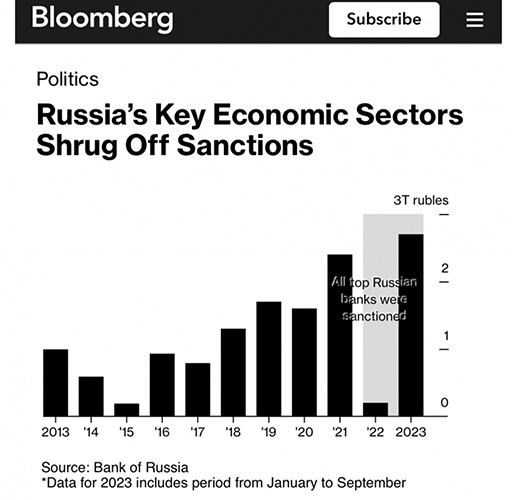
Russia’s third quarter growth hits 5.5%, outpacing estimates. Recovery shows limits of sanctions to punish Moscow over war. Key sectors of Russia’s economy are adapting and in some cases completely rebounding from unprecedented international sanctions imposed over the war in Ukraine, notes Bloomberg with a slight surprise.
Russia’s economic growth and surging consumer demand, boosted by ample government spending, have allowed businesses as diverse as banks, car manufacturers and airlines to find ways to cope and, in some cases thrive, despite US and European restrictions aimed at tanking the economy in retaliation for the war.
Annual growth accelerated to 5.5% in the third quarter from 4.9% in the previous one, the Federal Statistics Service reported late Wednesday. The result, the fastest pace of growth in more than a decade aside from a spike when Russia exited Covid lockdowns, exceeded the expectations of all economists surveyed by Bloomberg.
The rebound illustrates the limits of the sanctions that US President Joe Biden said were designed to cut Russia’s economy in half and turn the ruble into “rubble” as punishment for the February 2022 invasion of Ukraine. President Vladimir Putin has sought to boost ties with countries such as China and India as the European Union slashed trade links with Russia, including imports of oil and gas, in repeated rounds of sanctions.
Russia’s banking sector offers one of the starkest examples of where the economy has overcome the hit from sanctions. The largest Russian bank, state-owned Sberbank PJSC, which alongside all major players in the country’s market was designated by the US and the EU and cut off from the SWIFT international payments system, is poised to reap a record ruble profit this year.
Sberbank isn’t unique in that. The banking sector’s total profit for the first nine months of the year has already exceeded the previous annual record from before the war, in 2021. After falling to almost nothing in the first year of the invasion, bank profits may reach more than 3 trillion rubles ($33 billion) in 2023, said Valery Piven, managing director of the Russian rating agency ACRA.
That’s three times higher than the central bank initially expected this year, driven by a credit boom, the weakening ruble and low provisions. The regulator said Wednesday it won’t extend beyond the end of the year a series of support measures for banks because lenders are sufficiently stable and profitable.
According to ACRA, next year also is expected to be “quite successful” for lenders.
After two subsequent quarters of gains, Russia’s economy has almost returned to levels seen before the war, all but reversing the blow from sanctions.
The fiscal stimulus that has helped fuel the turnaround is set to continue, enabled in part by Russia’s ability to redirect oil supplies to other countries and to sell crude at prices above a $60 cap imposed by the Group of Seven nations and the EU.
Russia’s ability to find new sources for imports, or in some cases replace them altogether, was another factor in its recent recovery, said Stanislav Murashov, an economist at Raiffeisenbank in Moscow.
“Russian business is managing to apply very non-standard solutions,” he said. “We don’t yet see any severe deficit.”
The Russian car market bears this out. Seemingly dead after a mass exodus of Western brands, car sales have returned to pre-war levels in just over a year.
Russia’s Avtovaz controls another slice of the market and reported a 59% increase in production in the first seven months of the year as well as the best sales volumes in a decade despite restrictions on components supplies to the country. The US added Avtovaz to its sanctions list in September.
After its carriers were cut off from many international routes, Russian airlines turned to developing new domestic services in the world’s largest country by landmass. They have now reached a target of 50% of routes bypassing Moscow set by Putin in 2018, ahead of the original 2024 target, official data show.
The increase in domestic air travel, even as the authorities closed airports in tourist cities in southern Russia as part of the war on Ukraine, was largely due to government support, the Transport Ministry said in response to a Bloomberg request.
Despite the sanctions pressure, international air travel is “intensively developing,” with an almost 30% increase in passenger traffic in the first nine months of the year versus the same period a year ago, according to the ministry. Russia has air links with 37 countries and 59 foreign carriers provide services, the agency said.
read more in our Telegram-channel https://t.me/The_International_Affairs

 11:28 20.11.2023 •
11:28 20.11.2023 •






















